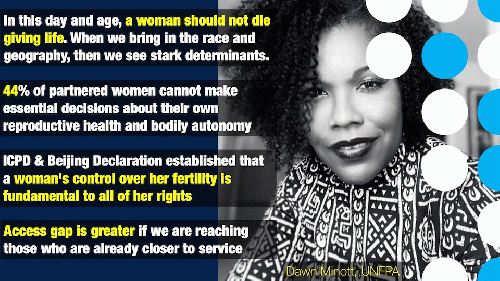Half of women cannot make decisions about their reproductive health and bodily autonomy
SHOBHA SHUKLA - CNS

gender equality is a fundamental human right and critical to deliver on SDGs
(Image by CNS) Details DMCA
In the lead up to 2025 World Health Day, it is important for us to review why almost half of women are not able to make decisions pertaining to their own reproductive health and bodily autonomy.
All governments had promised to deliver on UN Sustainable Development Goals (SDGs) by 2030, one of which is SDG indicator 5.6.1. "This indicator measures a woman's ability to make her own decisions about her sexual and reproductive health. Initial analysis suggests that over half (56%) of the married or in-union women are now in the driver's seat. But it also means that when it comes to these fundamental aspects of their lives, 44% of partnered women cannot make these essential decisions about their own healthcare, contraceptives, or their sexual health and rights," said Dawn Minott, Advisor on gender and gender-based violence at the United Nations Population Fund (UNFPA).
Dawn Minott was among the experts of a special side event organised recently on the margins of the UN Commission on the Status of Women (CSW69), by Global Center for Health Diplomacy and Inclusion (CeHDI) and partners.
Gender equality and women's empowerment at the heart of development
She added: "Over 30 years ago, the International Conference on Population and Development (ICPD)'s Programme of Action of 1994 and the Beijing Declaration's Platform for Action of 1995 were remarkable because they both placed gender equality and women's empowerment at the heart of development. These conferences established that a woman's control over her fertility is fundamental to all of her rights. The vision that also drives the 2030 SDGs Agenda and the call for universal sexual and reproductive health and rights is central to achieving SDG5 on gender equality and SDG3 on good health and well-being."
Access to sexual and reproductive health empowers women and girls, leading to improved health, economic opportunities and her stronger agency. It is important for us to celebrate the wins as a start because we have made strides. Globally maternal mortality has fallen by 34% in the past 30 years. Modern contraception use has doubled and as a result this has reduced unintended pregnancy in adolescent girls. There is also more recognition of gender-based violence with 162 countries globally having enacted laws against domestic violence now.
(Note: You can view every article as one long page if you sign up as an Advocate Member, or higher).





